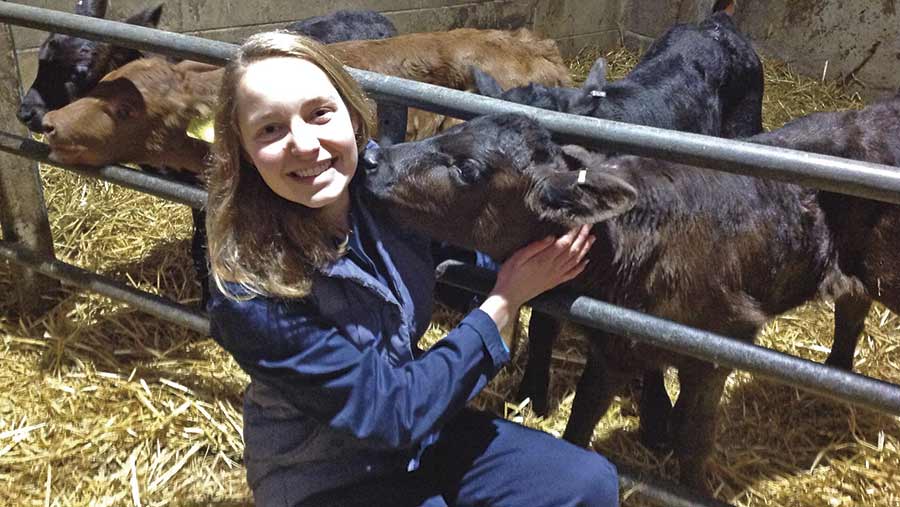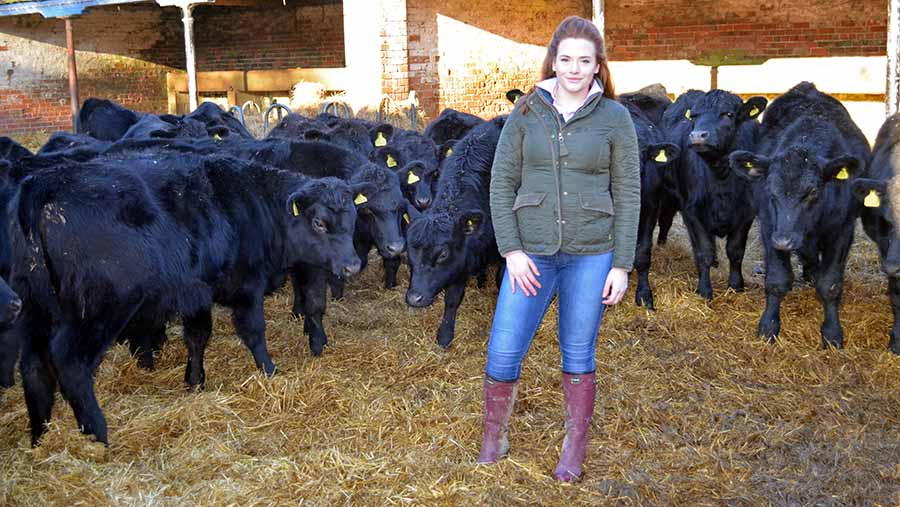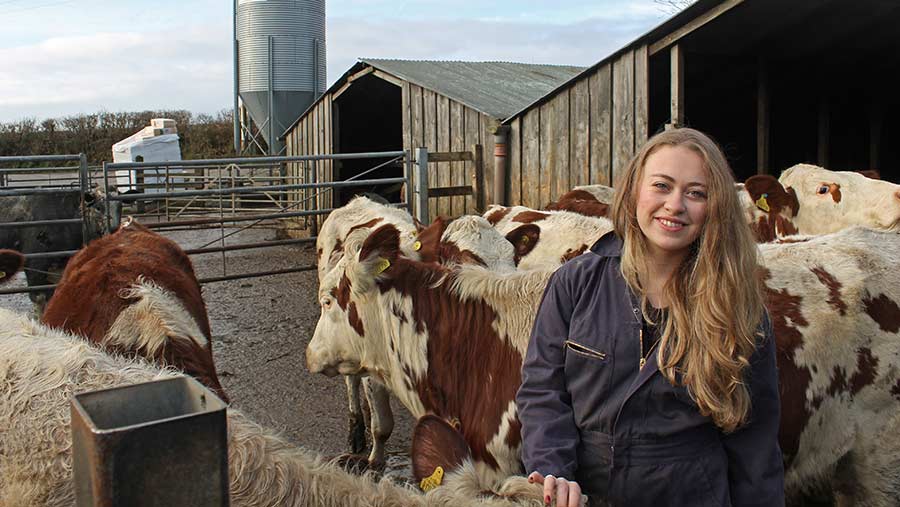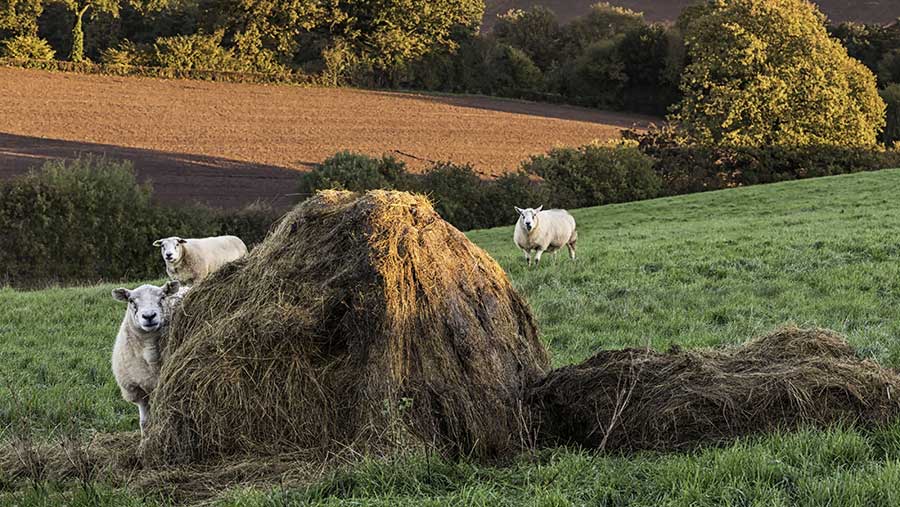Blogging competition reveals next gen’s farming views
 © Design Pics Inc/REX/Shutterstock
© Design Pics Inc/REX/Shutterstock Young people across the nation have strong views on farming and the countryside.
At Farmers Weekly, we’ve always been keen to make sure the next generation’s opinions are heard and the topics that matter to them are aired.
So we ran a competition, asking young people to write a piece with the theme A Taste of the Countryside.
See also: Radio presenter to become president of YFC
The entries touched on everything from milk prices and Brexit to Young Farmers’ Clubs and country sports.
They were thought-provoking and heartfelt.
Thanks to everyone who submitted pieces – we enjoyed reading them all. Here are abridged versions of our favourite four.
Here are abridged versions of our favourite four.
‘Let’s make farming the new Facebook’
Natalie Plummer, Stanton St Quintin, Wiltshire

Natalie Plummer
It’s 4am. Dad picks up his mobile.
“One of your cows is in my swimming pool,” announces a voice at the end of the line.
I assure you this is not a typical wake-up call in my family, and I can further assure you said cow and her other adventurous companions, who also made their escape that morning, are all now safe and well, unfazed by the whole affair.
I tell you this little anecdote to highlight the variety of heart-warming experiences, unexpected events, challenging decisions and often harsh realities farming and agriculture present.
We were fortunate our farming location is relatively rural, so the roads at that hour were deserted.
In addition, the cows got out of the field through a break in the fence – more likely caused by deer than deliberate force.
Unexpected and lucky
But unexpected as it was and as lucky as we were, we can see the reality of what might have been.
I am 21. I am excited yet also a little apprehensive about the future. I am positive about the future of farming for my family and the wider industry, which I believe has the greatest potential to expand and solve issues such as hunger, obesity, environmental degradation and climate change.
We have always needed to eat and we now need to feed in excess of 7 billion people.
On paper, we need to grow more, waste less, distribute better and reduce inputs.
In practice, we need to put more land back into agriculture, ensure that the proportion of food never actually eaten and wasted (through industry practice and consumer wastage) is reduced, reintroduce rationing and all go organic.
Feeding the world
OK, so that is unlikely to happen and probably would not be the best way of feeding the world (though I’m serious about controlling diets in the western world).
Here’s my idea. Pass a law that makes agriculture a mandatory subject in the primary and secondary classroom. Label it “agri-tech” or “i-farming”, and it will immediately become the niche subject that everyone is talking about.
Next, reinvent “green spaces in urban places” initiatives, so local people can produce their own food as part of their daily lives.
Then we need to get people stuck in. For example, my point on reducing inputs could mean using less herbicide to control grassweeds. So why not encourage people to hand weed instead?
Before you completely ridicule me, yes it would be on a small scale to begin with, but like most ideas, they start small and grow.
Weeding contests
Farmers could create competitions, they could use it to raise money for charity, and it could involve a celebrity. Do a marathon weeding session in a 4ha field, market it as “weed your way to weight loss” and see the crowds flock to your fields. And what do you know? Communities become interested in the rural landscape once more, calories are burned instead of fossil fuels, the nation gets
And what do you know? Communities become interested in the rural landscape once more, calories are burned instead of fossil fuels, the nation gets fitter instead of fatter and farming becomes the next Facebook.
I know the idea is a bit outlandish, but there’s too much “saying” and not enough “doing” at the moment.
We need a plan, and by a plan I don’t mean a 25-year strategy for food and farming, which is created by those who have no intention of seeing it through.
We need a vast overhaul of the industry, a mighty shock which makes people sit up and listen.
So, back to that 4am start. Farmers across the nation hear the ringing of their alarm clocks. Good job they get up and do the job they do. Otherwise, the people of Britain would awake to a very new landscape – one in which the supermarket shelves lay bare, bleak and empty.
‘The plague of internet isolation continues’
Evie Atterby, Wellington, Herefordshire

Evie Atterby
It seems like we make a lot of trade-offs for the pleasures of rural living.
I’m writing this in my living room in Herefordshire, a beautiful county I have moved to recently, one where I’m truly at home.
I’ll try to post this online later and it will take longer than if I had hand carved it on to slate and used a carrier pigeon for delivery. Why? Because I happen to live in the countryside.
0.3MBps was a personal best. I see the fear in my router, the tortoise of the broadband world, as I asked it to perform tasks well beyond its capabilities.
Feeling semi-rage, I called my “service provider”, which is ironic given that no service is being provided – insert eye roll here.
Stone-age tech
Do these people not understand we are trying to function in the modern world with stone-age broadband?
If this was London, Birmingham or Newcastle, there would be uproar and protests in the streets. But because I live in a village, it seems to be accepted that basic infrastructure fails us.
The reality is that 70% of the UK land mass is rural, 17.2m hectares dedicated to food production, of all different kinds, farmers requiring the electronic exchange of information and rural enterprises needing their emails.
Why is it that the 30% of the remaining landmass is deemed a more vital part of our upwardly mobile society?
How are we supposed to function, to develop new businesses and grow existing ones, when we are being left to stagnate, falling behind because we have nice views, and that should be enough?
Lord help you in many areas should you need to catch a bus or train, if you wish to email or even use your mobile.
Vital business links, jobs and diversification are being held back by the lack of resources and we shouldn’t be accepting this.
Knowledge transfer
Half a century ago, it didn’t matter, but we have been forced into an age of technology where knowledge transfer depends on strength of electronic communication.
Admittedly there have been steps forward, some areas of rural Britain now benefit from fibreoptic broadband, enabling businesses and social users to connect more efficiently.
But for others, the plague of internet isolation continues. One friend of mine was told it would cost them £24,000 as the cables needed replacing and as it was in a rural area it wasn’t seen as “vital” work. It was vital to her business, though.
The countryside isn’t just rolling hills and grazing livestock. It’s a glorious patchwork of individuals, businesses, communities and schools, people developing new ideas, launching new products, bringing food to the nation’s tables – and we all deserve solid infrastructure, whether that’s the ability to send an email or have access to a decent public transport network.
We all pay into this country, we should all reap the benefits, no matter how far from London we live.
‘Definitely not a 9 to 5 job’
Ruth Wills, Liskeard, Cornwall

Ruth Wills
The day starts with Jack getting up for milking, which starts at 6am. You really have to be a morning person for this job.
Jack works on the family dairy farm and there are 150 girls to milk, so this usually takes just under two hours.
They’re always eager to come in, as they have in-parlour feeders, so they can happily munch away while we do our work.
The milk is collected every other day and taken to a processing unit, ours goes to Cullumpton.
Some of the Organic Milk Suppliers Cooperative’s (OMSCo) milk is exported as far as China and Australia, but it travels all around the world. Some is even made into baby milk powder.
Breakfast time
Once milking is over, it’s time for a quick coffee and to feed the calves and, when that’s done, it’s breakfast time for us. I’ve got granola and yoghurt, and a cup of tea.
I like Yeo Valley’s yoghurt, mainly because that’s who OMSCo supply, and that’s where the farm’s milk goes. Jack has toasted crumpets with butter and a yoghurt.
After breakfast, it’s back to the farm, it’s calving time so we have to keep an eye on the cows that might calve soon, especially when we’re getting into winter.
Snoozing
Soon it’s time for afternoon milking and Jack walks the cows in from the fields. As I explain to non-farming people, some of the year they’re outside then, when the weather gets too cold and wet, they’ll come in and spend most of their time snoozing in their cubicles (beds). We’ll feed them silage too, as there isn’t much grass around in the winter.
Then about 5.30pm, after milking, it’s home time, but we’ll have to check the cows that are in calf at about 10pm, just to make sure nothing is calving. If they are, we’ll wait to see if they need a hand, or we’ll come back between 12am and 1am. Farming is definitely not a 9-5 job.
Sometimes we forget how much how much dairy is present in our diets and how much we rely on the dairy industry for our milk, cheese, yoghurts for example.
I always say to non-farming people, next time you’re picking up your pint in the shop, think about Jack going to work, and his early mornings and late nights looking after the cows, so that we can have milk in our tea and on our cereal.
‘Where memories are long and the weather is king’
Anna Bowen, Carmarthen

© FLPA / Allen Lloyd/REX/Shutterstock
Six years out of school and most of my friends have left the county, drawn away by work and education to the shimmering lights and wider opportunities of cities and larger towns.
When they come home for visits they almost always say the same things – it’s so quiet, what does everyone do, there’s no diversity, nothing has changed. Most of the time I nod and agree, but are they right?
Life in the countryside is dictated by the seasons and, though the change is predictable and cyclical, each new month brings a change in routine and new sources of adventure.
Fat lambs
The shortness of summer is emphasised by the need to make silage, repeatedly, while the sun shines and the grass grows. The lambs grow fat and the cows graze, cars lining up on country lanes to let them pass for milking.
Autumn brings hedges full of sloes for making gin and the distant roar of harvest. Some of the block-calving units knuckle down to the rush of bringing in a new generation of stock, and pheasants grow uneasy at the crack of guns.
Port and sausage rolls
Winter and frosts spread their web across the fields and the shooting season has filled farm shops and cafes with a bounty of pheasant and partridge.
Saturdays are a haze of port and sausage rolls followed by fast-galloping across ploughed fields and through bare woodland.
The mud glistens thick and fat beneath glossy hooves, and hands wave from windows as we pass. The hunting field is a cross-section of society – farmers, landowners, teachers, stay-at-home-mums, shopkeepers, nurses, and businessmen.
And then to spring; the grass growing and the wheat ripening, the rush of calves and the bleat of lambs. My friends in London Instagram their first images of cherry blossom; in fruit-growing areas, the orchards are full of white and pink flowers.
The countryside is as diverse and challenging as any other place, but for me, it is a place where I am fortunate to have an exciting and rewarding career, brilliant hobbies, and the opportunity to watch nature’s awesome changes.
For others, it is a place with few options, slow broadband, slow buses, and grinding poverty. It is a place little understood and much stereotyped, where generations pass without leaving a valley, where memories are long and the weather is king.
The countryside tastes different every season, whether it is a glut of blackberries, spring lamb, the first potatoes, or the slow simmer of a venison casserole.
It reflects the diversity of the people who make it and the agriculture that sustains it.
It is playground and workhouse, pleasure and poison, wide sky and cell, life and death.
What is there to do in the countryside? Everything.
Sponsor’s message
![]() NFU Mutual, in partnership with Farmers Weekly, launched the A Taste of the Countryside blog competition for young farmers at Fertile Minds 2016 – the conference for young, business-minded farmers.
NFU Mutual, in partnership with Farmers Weekly, launched the A Taste of the Countryside blog competition for young farmers at Fertile Minds 2016 – the conference for young, business-minded farmers.
As the UK’s leading rural insurer, we are proud to be supporting the next generation of young British farmers entering the industry.
This is the perfect opportunity for Evie, Anna, Natalie and Ruth to build and develop their profile as future voices of farming.’
